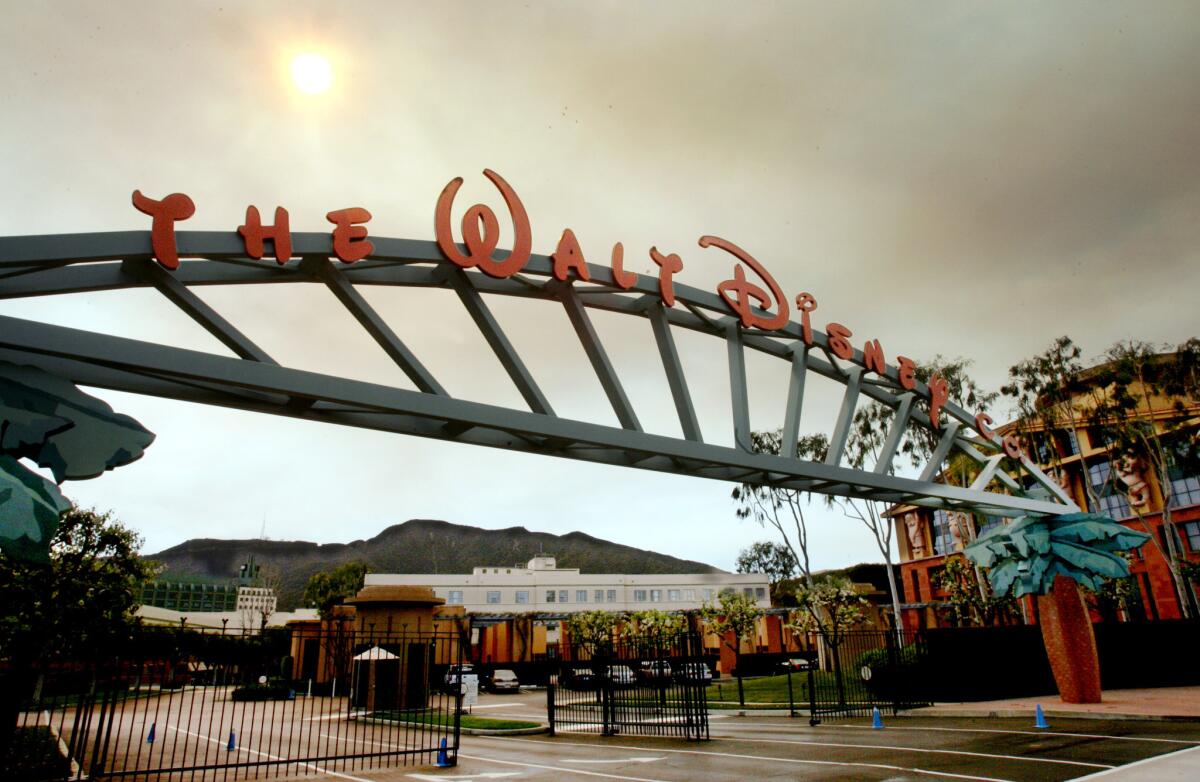The end of the backend? Disney wants to limit profit participation on its new TV shows

Walt Disney Co., which became a dominant player in television production with its acquisition of Fox assets earlier this year, is pushing to transform how TV show creators are compensated for their work.
For decades, the brass ring for showrunners was seeing their series hit the 100-episode mark.
Shows reaching that milestone — usually achieved at some point in the not easily attained fifth season of a network run — became ripe for syndication, and the rich financial rewards that came with it.
These payments have gone to creators, powerful stars, and anyone else who owned a piece of the “backend.” For a hit show, such payouts could dwarf the fees earned during the early years of a show’s run.
But the streaming revolution that has upended the TV business is starting to disrupt this compensation system, which has helped finance the purchase of many a Bel Air mansion.
As of this summer, Disney is pressing TV producers and other profit participants in its shows to accept a new formula offering profits sooner in exchange for complete control of any future licensing revenue, the Los Angeles Times has learned from conversations with Hollywood agents, attorneys and union representatives. Such deals would limit the financial windfall a major hit like “The Simpsons” or “Grey’s Anatomy” could generate.
Disney wants its payment system in place as it approaches the launch of its streaming service Disney +, scheduled for November.
Although Netflix and Amazon have been making such deals for the last few years, Disney would be the first legacy media company to require them for all new TV shows — whether on cable, broadcast or streaming. The change could make it easier for other studios to follow suit, given Disney’s dominant role in the TV production business as the owner of 21st Century Fox TV, ABC Studios and Fox 21.
While some have signed these deals, others have balked, sources said. Disney is asking producers to accept contracts that would give them a share of profits starting in the second year of a series,according to a Fox contract document obtained by The Times. Producers will also be eligible for a series of bonus payments based on a show’s success and longevity.
The trade-off is that Disney would control all licensing of the series to local TV stations, cable networks, streaming services and foreign broadcasters, essentially buying out whatever share of profits are generated by those sources.
The new deal structure, the contours of which were first reported by Deadline in July, is already getting pushback from agents and lawyers representing talent who believe it will substantially reduce income for creators whose shows became hits. Producers, who can get checks for their involvement in a project years after its initial run, are also skeptical.
“They didn’t punish Lucille Ball when ‘I Love Lucy’ was a massive hit 20 years after it was canceled,” said Propagate Content Chairman Ben Silverman, who has an ownership stake in “The Office,” which he developed the U.S. version of for NBC.
Leigh Brecheen, a partner at the entertainment law firm of Goodman, Schenkman and Brecheen, said she has clients who have not signed onto the deals with the Disney-owned entities due to objections to the new plan. She said the choice is the client’s, but she is reluctant to close deals based on how the series bonuses are currently structured.
“They can run it 10,000 times on their [streaming] service and they can run it 10,000 times on their own network, they can sell tons of advertising, tons of subscriptions and you won’t get any additional money,” Brecheen said.
Disney’s new approach has also drawn the attention of SAG-AFTRA, whose members can be rewarded with profit sharing when they star on hit shows. “We are monitoring these changes very closely and would be concerned about any attempt to cap or shortchange backend payments for talent,” said SAG-AFTRA Executive Director David White.
Disney declined to make an executive available to discuss the plan. But the rationale it has presented to agents, according to people familiar with the talks, is that a change to the long-running system is necessary because traditional syndication and foreign markets are deteriorating.
Viewers can now access their favorite shows on DVRs and streaming sites, diminishing the audience for repeats on traditional TV, which has seen its usage levels among people under 50 decline steadily in recent years. Disney has argued that lower ratings have resulted in TV stations and cable networks spending less on off-network series and that the demand for U.S. programming among international broadcasters has slowed as they invest more in local productions
But competitors see Disney’s move as an opening to lure creators.
“We at Fox Entertainment still believe in creating and sharing with our talent the holy grail of television, the backend,” Charlie Collier, CEO of Fox Entertainment, said last month at the Television Critics Assn. summer press tour. Fox Entertainment is the new TV company formed from the assets not sold to Disney.
Disney’s deals are similar to offers TV talent agents have already accepted from Amazon and Netflix.
Amazon awards profit participation in the third season of a show based on a value the company determines for it. Netflix pays creators for the cost of production and adds a negotiated profit payment on top of it starting with the very first episode, but creators give up the rights to any backend revenue.
Disney determines the value of each show in its new deals, basing its estimates on the financial performance of other series from the last few years. The participants would receive a negotiated percentage of — or points in — the series based on that figure, starting in the second season.
Profit participants would see the value of their stakes grow each season a show is renewed. They would also be eligible for pre-negotiated bonus payments for Emmy and Golden Globe nominations, and a show’s rankings in the Nielsen ratings.
Compensation for revenue generated through music publishing, merchandising, DVD and video downloads would also be paid from a bonus pool. A program’s popularity on Disney + and Hulu would be rewarded as well.
A major benefit for Disney, according to agents who have studied the deal, is that the company would no longer have to determine fair market value before putting one of the broadcast or cable series it owns on Disney +.
It’s a way to bypass the situation NBCUniversal and WarnerMedia recently faced when they had to outbid Netflix to get the rights for their properties — classic TV hits like “The Office” and “Friends” — to run on their own upcoming direct-to-consumer video services.
NBCUniversal agreed to pay $100 million annually in a five-year deal to get the streaming rights to “The Office.” Netflix sought a shorter-term deal at $90 million a year to retain it. The series, which ran on NBC from 2005 to 2013, was the streaming service’s most-watched program in 2018 according to Nielsen.
When NBCUniversal pays itself for this program from its own studio, a sizable chunk of the money will go to the show’s profit participants, as it did when the show was licensed to cable networks and local TV stations. The same thing happened for the creators and actors in “Friends” when WarnerMedia paid to bring the series to its new service HBO Max. Under Disney’s plan, that would not happen with future series as the company will own 100% of them in perpetuity.
Agents believe Disney is also looking to avoid the litigation that can occur with profit participants. A company has to make a good-faith effort to determine the value of a series before selling it to itself for syndication or streaming, which can include making programs available to outside parties.
Numerous lawsuits over self-dealing have been filed since production companies and TV networks were snapped up by media conglomerates that started forming in the 1990s. Nearly 20 years ago, producer Steven Bochco sued 20th Century Fox TV for selling reruns of “NYPD Blue” to its cable network FX. He said he was deprived of millions the show could have earned on the open market. Actor Alan Alda also had legal battles with the studio over his profits from the hit sitcom “M*A*S*H.”
The new compensation model would give Disney the flexibility to move shows from its TV networks such as ABC, FX and Freeform to Disney+ without outside bidders driving up the price. Disney’s move would prevent the kind of costly dispute over profits that resulted in a settlement this week between now Disney-owned Fox and the producers of the “Bones” TV show.
While Disney’s plan involves profit participants, some entertainment industry guild members fear that companies may go down the same road with residual payments and limit those as well. Residuals are paid to writers, actors and directors whenever a show reruns.
John Wells, a former Writers Guild of America West president and executive producer on such shows as “ER,” cited deals made by the streaming companies — which have begun buying out residual payments on some shows — in a letter to WGA members that urged them to make the protection of residual payments a priority in the next contract negotiation.
“Our Guilds’ energies need to be focused on how we will protect and replace these essential residuals as the distribution model for our work changes drastically,” said Wells, who has faulted the union’s handling of the standoff with agents over packaging and other practices.
Agents and entertainment lawyers privately say that some younger writer-producers have signed on to Disney’s terms. Several industry executives note that agents have already opened the door to Disney’s demands by agreeing to buyouts of profit sharing with Amazon, Netflix and Hulu. That includes rich deals for some of TV’s top creators including Shonda Rhimes and Ryan Murphy.
“The precedent has been set by the new lions in town,” said Ted Harbert, a former executive for ABC and NBC. “The agents I talk to say, ‘My guy is with the Netflix deal — they are going to get on the air, they are not going to get as many notes as the networks give them, and they are only going to have to do 13 episodes a season. So my guy is fine with that.’”
While big-name talents will likely negotiate better deals than Disney is offering, Harbert believes younger writers and producers may be willing to accept the plan to be a part of the new television age where streaming offers the flexibility of shorter episode runs, instead of the traditional 22, along with more creative freedom.
Privately, Disney executives say that its system will reward more show creators, since more shows are modest successes in today’s fragmented TV market.
“I don’t think the younger generation imagines themselves being like [1980s TV producer] Steve Cannell driving around in a stretch limo watching dailies and having a massive house in Brentwood,” Harbert added. “A lot of them say ‘I’ll be just fine with a 6,000 square-foot house in Encino with a nice pool. And I can have a decent life and I’m not working until 4 in the morning.’”
More to Read
Inside the business of entertainment
The Wide Shot brings you news, analysis and insights on everything from streaming wars to production — and what it all means for the future.
You may occasionally receive promotional content from the Los Angeles Times.












